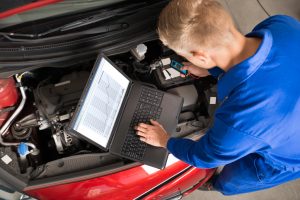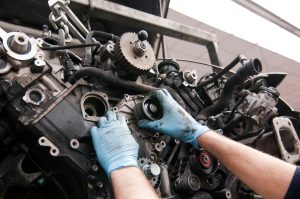Vehicle owners are usually very particular with who they trust to work on their cars and trucks. Some vehicle owners will find one repair shop and keep using it for years. Meanwhile, others feel more comfortable taking their vehicles to an automotive dealership. Whichever option is selected, most owners refer to the person who works on their car as their mechanic and not their automotive technician. At one point in time, there was a distinct difference between the two, although times have changed.
Featured Program:
Penn Foster Career School:
• Online Auto Repair Technician Career Diploma Program
Changing Times in Auto Repair
Some people use the terms auto mechanic and automotive technician separately while others lump the two together. So what is the difference? It may only be a matter of mere semantics in this day and age. The traditional point of view is that auto mechanics described the individuals who take apart your vehicle and make the actual repairs.

Auto Technician at Work
The conventional view of automotive technicians portrays them as individuals who deal with more of the computerized side of vehicles. This became popularized as cars started to become more computerized, which presented a need to deal with the onboard diagnostics. However, that does not mean an auto mechanic cannot be skilled in this area. Many mechanics have adapted a wide array of skills that has enabled them to become capable of servicing vehicles of all makes and models.
Auto Mechanic Role
One glimpse at the word auto mechanic reveals the nature of the job as it involves the mechanical aspects that come with repairing vehicles. Historically, that involved the basics of auto repair and developed the stereotypical image of a mechanic working in a garage while being stained with grease. However, that is not the case in the present day.
Vehicles have been advancing at an extremely rapid pace. It no longer takes a wrench and socket set to fix engine problems. Computerized systems have become so integrated with engine systems that there is a higher level of sophistication in the way vehicles function. All repair shops must now be equipped with diagnostic tools that are specific to auto repair. That means anyone working on a vehicle will need to know how to use these advanced tools, thus diminishing the old image of a traditional mechanic.
No longer does auto repair simply require the physical act of fixing a problem. In every situation, there is a need to identify the problem while critical thinking and quantitative analysis are also vital parts of the job. Mechanics cannot simply repair a problem without skipping those other steps. Therefore, the new age of the auto mechanic has required individuals to know the technical aspects of the job as well.
Auto Technician Role
The mere title of auto technician implies that the job is comprised of technical components. There is no denying that there are a lot of diagnostics involved with repairing newer vehicles, which makes it essential to understand how all of those parts work cohesively. Auto technicians are skilled in diagnosing engine problems and also use the latest diagnostic tools in the process. However, their work does not end there.
Repair shops are not going to hire an automotive technician to simply diagnose problems and then hand off the second part of the job to someone who is labeled as an auto mechanic. Auto technicians typically take care of the diagnosis and repair. Otherwise, it would cost a repair shop much more in terms of paying its employees.
The term technician seems to carry more respectability, although it may be a case of mere semantics. In many repair shops, auto technicians perform the same duties as auto mechanics. In some instances, auto technicians have a bit more experience. Entry-level mechanics may attend to simpler tasks, such as oil changes and tire rotations. However, auto technicians may be more suited to provide more in-depth diagnosis and repair. A lot still depends on the level of certification as that is a telling sign of how skilled an auto technician may be.
Automotive Technician Certifications
An automotive technician is considered to be someone who has been trained and certified by ASE (Automotive Service Excellence) and the SAE (Society of Automotive Engineers). These organizations use the term automotive technician as opposed to auto mechanic. However, neither organization has made a clear distinction as to the exact difference between an auto mechanic and an auto technician. The most common ASE certification is awarded by earning a passing score on 8 exams which cover the following areas:
These areas are ones that are typically covered by an auto mechanic on a daily basis. Showing a proficiency in all these areas by passing the respective exams can earn the status of master technician. There is no master mechanic status. Mechanic is a term that is no longer used by organizations like the ASE. On paper, the term technician is widely used, although most people do not speak the term as frequently as they use the word mechanic. Auto technicians are the title given when earning a certification, although they do a great deal of mechanical work inside a repair shop.
Many Associate Degrees issued in automotive technology. Automotive Technician Certificates are also distributed upon the completion of a Career Training Program. It remains difficult to find many Auto Mechanic degree or certificate programs, although what a mechanic does is taught within these respective curriculums. It is simply called something else.
Auto Mechanic and Technician Differences
An auto mechanic is sometimes referred to as a journeyman wrench, grease monkey, lube tech, oil changer, or a tire and brake repairman. The one commonality in all those terms is that the mechanic has no specialized training. The truth is that there remains a fair ratio of skilled technicians to basic mechanics in the dealer network. Auto mechanics with less skills or formal training are necessary in private auto repair shops because they are paid lower labor rates. This allows repair shops to keep their labor rates low, which enables them to compete with larger repair and service centers. Once a mechanic elevates his/her status with a certification, that can all change.
There are also other tests that can enhance an automotive technician’s status. For instance, a master diagnostic test is taken by someone that wants to be a repair shop leader. There is also a hybrid special systems test that is manufacturer specific. This test is often taken by those who work as manufacturer specific auto technicians. Meanwhile, these advanced technicians may lead a team of mechanics that perform more routine tasks.
Similarities of Auto Mechanics and Technicians
As previously mentioned, many mechanics do the same job duties of a technician. In many of those instances, a technician is nothing more than a formal title given to a mechanic. Both are expected to uphold professional codes of conduct and practice regular safety procedures. Both are also entrusted with the diagnosis and repair of vehicles.

Mechanic at Work
When compiling data for annual jobs and salaries, the U.S. Bureau of Labor Statistics places auto mechanics and technicians in the same category. The annual salaries of each are added together in order to calculate a mean and median nationwide pay rate. Many auto repair shops use one term or the other when referring to those who service and repair vehicles. And in the present day, the line between an auto mechanic and auto technician has become blurred. The mechanic is required to complete technical tasks while the technician is expected to complete mechanical repair tasks.
Auto Repair Duties
When it comes down to it, the exact duties of someone who provides auto repair are generally what defines their pay rates. Also, those with ASE certifications can expect to earn more than those who are not certified. This is because the level of complexity within their daily job tasks are much higher. Some job listings use the term auto mechanic mechanic while others use auto technician. However, it really comes down to the specific duties that define the job. Repairing newer automobiles now requires the use of diagnostic tools and the interpretation of data. The tasks are not as easy to sort into simple and complex, as there is more of a gray area.
In the end, all technicians are mechanics, but not all mechanics are technicians. The term technician implies that a more advanced skillset has been acquired while a mechanic can still represent those who conduct basic auto repair. That does not diminish the importance or skill level of mechanics. It is more or less a matter of semantics and a lot of other areas are more revealing when determining the quality of an auto repair shop. Some of those areas are as follows:
